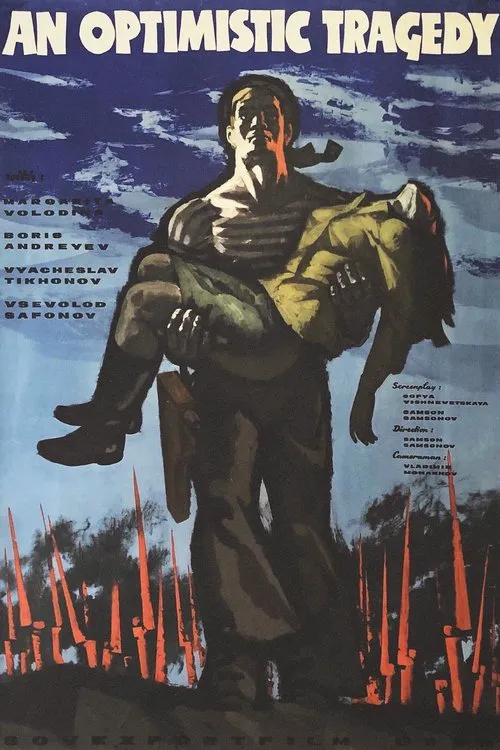An Optimistic Tragedy

Plot
In the midst of World War I, the tumultuous year 1918, the Russian warship Gromoboi serves as a microcosm of the nation's fractured identity. Anarchist sailors, weary of the bureaucratic inefficiencies of the old regime, have taken control of the vessel. Their leader, the enigmatic Vozhak, exudes a sense of freedom but lacks the discipline necessary for true revolution. The arrival of a woman commissar from the Central Committee of the Bolshevik Party heralds a new era for the Gromoboi. Her task is daunting – to eradicate the lingering ideology of anarchy and forge a new, organized entity: the First Sailor Regiment. The commissar's mission is underscored by the arrival of Lieutenant Bering, a relic of the tsarist fleet who served on the battleship "Emperor Paul I." Bering's experiences on the Gromoboi have left him disillusioned with the old guard, yet he still clings to the traditions that forged him as an officer. The commissar's appointment of Bering as the commander of the regiment comes as a surprise, considering his past and the sailor's distrust of the old regime. As the story unfolds, the commissar's resolve is tested by the inherent contradictions within the Gromoboi's society. The sailors, having broken free from the tyranny of the tsar, now grapple with the uncertainty of a new order. Their anarchic way of life, though romanticized as a rejection of authority, proves to be a hindrance to the efficient functioning of a naval detachment. The commissar struggles to reconcile the sailors' desire for freedom with the need for discipline and organization. Bering's character serves as a catalyst for this internal conflict. As the newly appointed commander, he navigates the fine line between asserting his authority and earning the trust of the sailors. His past as a tsarist officer weighs heavily on him, and he must confront the consequences of his previous allegiances. The commissar and Bering form an unlikely alliance, with the former's determination to impose order clashing with the latter's reluctance to betray his heritage. The commissar's methods, however, are not without controversy. Her approach to reforming the Gromoboi is shrouded in mystery, with elements of coercion and persuasion. The consequences of her actions are far-reaching, affecting not only the sailors but also those who have entrusted her with the mission. Vozhak, the charismatic leader of the anarchists, is wary of the commissar's intentions and sees her as a pawn in the larger game of power. As tensions rise between the rival ideologies, the threat of external pressures becomes increasingly evident. The backdrop of a world at war, with nations vying for power and resources, hangs heavy over the narrative. The Gromoboi's fate is inextricably linked to the global landscape, and the sailors' struggles with governance and identity mirror the turmoil afflicting the world. Through the prism of the Gromoboi, An Optimistic Tragedy poses a profound question: Can an ideal, unbridled by the constraints of authority, be reconciled with the harsh realities of organization and discipline? As the sailors navigate the complex waters of revolution and identity, their choices will have far-reaching consequences, echoing the tumultuous events unfolding across the war-torn continent. In the world of An Optimistic Tragedy, the lines between freedom and order blur, revealing a nuanced exploration of human nature, politics, and the eternal struggle between opposing forces. As the narrative hurtles toward its conclusion, the fate of the Gromoboi, its inhabitants, and the ideals that have shaped them hangs precariously in the balance. Within the tragic confines of the Gromoboi, a world in constant flux, an uncertain future beckons – a testament to the indelible mark of human resilience in the face of chaos.
Reviews
Recommendations



